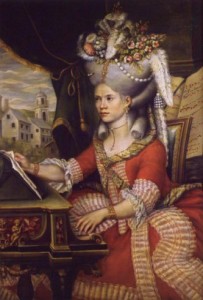 Relevant History welcomes back historical mystery author Beverle Graves Myers, who combines a love of Italy, opera, and traditionally written mysteries in her Tito Amato novels featuring an 18th-century singer-sleuth. The latest title is Whispers of Vivaldi. Bev also writes short fiction that has appeared in Alfred Hitchcock Mystery Magazine, Spinetingler, and Crime City Central (audio). Her work has earned nominations for the Macavity, Kentucky Literary, and Derringer awards. Bev and husband Lawrence have recently relocated to south Florida. For more information, check her web site, and look for her on Facebook, Twitter, and Goodreads.
Relevant History welcomes back historical mystery author Beverle Graves Myers, who combines a love of Italy, opera, and traditionally written mysteries in her Tito Amato novels featuring an 18th-century singer-sleuth. The latest title is Whispers of Vivaldi. Bev also writes short fiction that has appeared in Alfred Hitchcock Mystery Magazine, Spinetingler, and Crime City Central (audio). Her work has earned nominations for the Macavity, Kentucky Literary, and Derringer awards. Bev and husband Lawrence have recently relocated to south Florida. For more information, check her web site, and look for her on Facebook, Twitter, and Goodreads.
*****
 A portrait hangs in a dusty corner of the La Scala opera house in Milan. A woman in an 18th-century gown and towering, flower-bedecked wig sits at a harpsichord, staring into space. She appears distant, sullen, and not entirely comfortable in her elaborate dress. Known as Teresa Lanti, she was an accomplished soprano and the mistress, for a time, of the even more famous Giacomo Casanova.
A portrait hangs in a dusty corner of the La Scala opera house in Milan. A woman in an 18th-century gown and towering, flower-bedecked wig sits at a harpsichord, staring into space. She appears distant, sullen, and not entirely comfortable in her elaborate dress. Known as Teresa Lanti, she was an accomplished soprano and the mistress, for a time, of the even more famous Giacomo Casanova.
I introduce you to Teresa Lanti because this pensive-looking woman inspired a character that came to mystify Tito Amato more than any other. Who was she really?
First a little about Casanova. The man whose name has come to define womanizing was a real person, actually a Venetian of Tito’s era. He was born in 1725, the first child of Zanetta Farussi, a comic actress who went by the stage name of La Buranella, and an actor-dancer named Gaetano Casanova. Or perhaps that’s only part of the truth. Casanova often claimed Venetian aristocrat Michele Grimani as his father, but where Casanova is concerned, truth is a slippery concept. History does record that young Giacomo refused to go along with his parents’ plan to make him a priest and was expelled from a seminary for immoral conduct. He proceeded to scheme his way through Europe, romancing a dazzling array of women (and several men) and running afoul of authorities at every turn. Though Casanova is famed for being a self-styled great lover, he was also a cabalist, spy, soldier, violinist, lottery administrator, and more. Near the end of his long life, he finally settled down to write a highly entertaining twelve-volume autobiography, which I often mine for eighteenth-century background and characters.
Which brings us to Teresa Lanti, one of Casanova’s more peculiar conquests. In Volume Two of his autobiography, our lovable rogue tells the tale of his compelling attraction to Bellino, a teenaged castrato traveling with his theatrical family. Castrato? Yes! If you’re unfamiliar with 18th-century fads, Europe had gone mad for Italian opera and its star singers. The castrati were men who had been gelded as pre-pubescent boys and were revered for their golden voices that held an uncanny combination of pitch and power. The effect was ethereal and haunting, causing women to swoon and bringing tears to hard men’s eyes—but I digress. When Casanova encountered Bellino at an inn in Ancona, he could scarcely believe that the beautiful creature was male, even though Bellino himself swore it was the truth. So intrigued was Casanova that he tried every trick of seduction to induce the singer to share his bed, even offering the boy’s mother a gold doubloon to view his genitals.
To make a long story short, Casanova eventually invaded Bellino’s breeches and discovered a false penis. He describes it thusly, “long, limp and as thick as one’s thumb, pale, and of very soft leather.” Bellino was indeed a female. Salimbeni, a valid castrato singer, had been her music master and helped develop her fine soprano voice. She blamed her unfortunate situation on her mother’s scheming. Two issues stood behind the disguise. As theaters within the Pope’s political domain banned females from the stage, castrati sang the prima donna roles in Rome and other cities within the Papal States, including Ancona where Casanova met Bellino. In Venice and other, more progressive musical centers, women took their rightful place as prima donna, but they were paid in woeful contrast to the reigning star castrati. Posing as a man, Bellino would have more opportunity to perform and earn a higher salary while doing so.
Casanova recounts that his affair with Teresa, who was sometimes called Angiola on opera bills, was fraught with uncertainty on his part. However, it lasted long enough for her to become pregnant with his son, Cesarino Lanti, whom she went on to raise as her brother. Eventually the couple parted. Casanova sent Teresa to Naples, stating that he could not bring himself to deny her the career she deserved, and he continued on his all-too-merry way. Teresa married Cirello Palesi, a young Roman, and traveled Italy singing prima donna roles in major opera houses. A few years later Teresa and Casanova met one more time, but the magic was gone.
And, at some point, she had her portrait painted.
Highly intrigued by Teresa’s story, I was determined to include a gender-bending character in Whispers of Vivaldi. In this final Tito Amato mystery, set in the dazzling, decadent world of baroque Venice, Tito spars with Angeletto, a young male soprano who has taken Milan by storm. Tito is depending on his star power to save the opera house from ruin, but is the heavenly singer all that he appears to be? Whispered rumors quickly fly through the taverns and coffee houses of Venice. Angeletto is too lovely to be a man—shouldn’t he be wearing skirts instead of breeches? Tito begins to suspect that he’s been tricked by a daring female impersonating a castrato. If the rumors are true, not only will Tito become the chief laughingstock of Venice, but the Senate is apt to withdraw its sponsorship of the opera house altogether. Like Tito, the reader can never be certain just who this amazing singer really is.
If you think this all sounds very Victor Victoria (the delicious 1982 musical comedy starring Julie Andrews) you’re not alone. I had to wonder if the screenwriters were familiar with Teresa Lanti, or, to repeat the old proverb, there’s really nothing new under the sun.
*****
 A big thanks to Beverle Graves Myers. She’ll give away a signed hardcover copy of Whispers of Vivaldi to someone who contributes a comment on my blog this week. I’ll choose the winner from among those who comment by Saturday at 6 p.m. ET. Delivery is available within the continental United States only.
A big thanks to Beverle Graves Myers. She’ll give away a signed hardcover copy of Whispers of Vivaldi to someone who contributes a comment on my blog this week. I’ll choose the winner from among those who comment by Saturday at 6 p.m. ET. Delivery is available within the continental United States only.
**********
Did you like what you read? Learn about downloads, discounts, and special offers from Relevant History authors and Suzanne Adair. Subscribe to Suzanne’s free newsletter.

Wow, I can hardly wait to read this new Tito novel from Beverly, but why will it be the last???
Thanks for stopping by, Marilyn. I just finished reading it, and it’s quite good. I, too, wonder why it will be the last Tito novel. He’s a great sleuth!
Unfortunately, Tito’s story is complete. In ways, I hate to leave the series–Tito has become a member of the family–but I have nothing left to say. I did manage to tie up a lot of loose ends for the series characters and leave Tito in a good place.
Bev, when I read “ethereal and haunting” I immediately thought of boy sopranos who sing during the Festival of Nine Carols in Cambridge on Christmas Eve, broadcast by the BBC. I believe there are some old recordings of castratos but have never heard one, so tend to think of Tito as sounding something like that.
All in all, a fascinating story. History is full of them! So many stories and so little time….
Beverly, I first read Face of the Enemy that you co-wrote with Joanne Dobson. Loved it. In fact, I reviewed it on Writers Who Kill a year or so ago. Then I read interrupted Aria and was hooked. I was fascinated with the history and Tito Amato. I ordered what I thought was the next in the series, Her Deadly Mischief and found out I was missing three in between, so I need to order the missing ones to find out more about Tito and his fascinating time – so much I don’t know.
You will have some surprises, Gloria. One of them is the return of Tito’s sister Grisella. She was too good a character not too bring back. Enjoy!
Tito does have that haunting choir-boy voice, but he can deliver it with the powerful lungs of a full-grown man. I think that combination was what made the castrati so devastating to audiences.
I think I have to fill in some Tito stories in the middle before I treat myself to the last one.
People often find modern countertenors unearthly (one of them, an apprentice at the Santa Fe Opera, sang at our church this summer and you could almost see people jump when he opened his mouth); I’ve often wondered what the difference in timbre would be between that and a true castrato.
Margaret, if I had a time machine, my first journey would be to a certain night in Venice when Farinelli and Cafferelli, the two greatest castrato singers of their time, performed together. Then I could answer that question. Unfortunately, I don’t have that time machine and can only imagine. My guess is that there was something very special about the operatic castrati that is lacking in the countertenor.
Imagine opera-castrati w/pure focused notes without heavy vibrato, perfectly on-pitch even w/rapid notes, 5 times breath capacity of a tenor + long unbroken lines, trumpet-like power, beautiful semi-masculine tone not like most countertenors or women. Think boy soprano Steven Möckel + Maria Cristina Kiehr.
How have I missed the Tito stories?! Looking forward to reading them all. I love historical novels.
I simply love the stories that Bev Myers writes. They are set in an interesting time and place, about opera and singers which I love, and altogether a refreshingly different type of mystery. I’d heard of Castrati but knew little about them so reading these stories has given me an insight into this strange world.
Thanks for this blog, Bev, very interesting as always and thanks Suzanne for guesting her!
Loretta
The book sounds wonderful, but I must read the others first. I only just discovered you and your books, thanks to Suzanne’s blog. I haven’t read a good historical mystery in awhile so I’m looking forward to it. Thanks for sharing.
I’m so pleased to hear that people intend to catch up on Tito’s story. Doing a happy dance!
Berverle, great title. Casanova is always fun–and we can have fun with him. Seducer, writer, violinist–what’s not to love! And Vivaldi, for me, always symbolizes Venice at its most intriguing. It was a perfect time–when Venice was the center of the world and love came easily to those who knew how to go after what they wanted.
I was surprised to learn that Casanova also convinced a lot of people that he had occult powers, much like Count Cagliostro. He must have possessed a silver tongue. And a huge ego, of course.